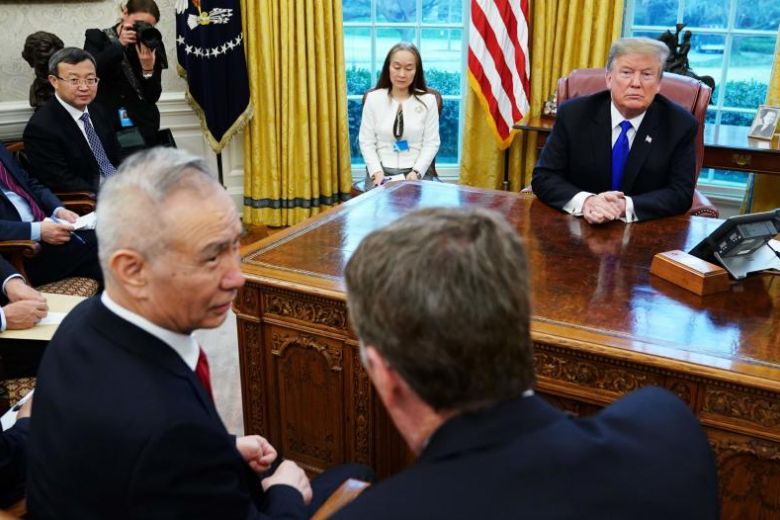Less than a week after the White House described trade talks in Beijing as "candid and constructive",
白宮稱在北京舉行的貿易談判是“坦誠且具有建設性的”,
American and Chinese negotiators met again on April 3rd in Washington, DC.
不到一周后,美國和中國談判代表在華盛頓特區再次會面。
There is talk of a summit between the two countries' presidents. But amid the upbeat noises are a few discordant notes.
有人稱兩國領導人進行了會晤。但在這歡快的聲音中夾雜著一些不和諧的音符。
Without a deadline, the discussions could drag on, or even stall.
沒有截止日期的話,討論可以延期或甚至是停止。
Although the contours of a deal seem clear, the final items are always the trickiest. And even if a deal is struck, it may not be a good one.
雖然協議的輪廓看似清晰,但最終條款總是最難搞定的。即使達成協議,這也有可能不是一份好協議。
The two sides have already agreed on provisions relating to currency manipulation,
雙方已經就匯率操縱規定達成一致,
and are hashing out how much more American goods the Chinese will commit to buying.
并正在協商解決的是中國承諾更多的購買多少美國產品的問題。
Rules on technology transfer and American companies' access to the Chinese market are still being discussed.
關于技術轉讓以及美國公司進入中國市場的規定仍在商討之中。

Also on the table will be American demands that China relaxes its attitude to trade in data, which it sees as a threat to national security.
同樣將要討論的還有美國要求中國放松其對數據貿易的態度,中國將之視為對國家安全的威脅。
Some in the Trump administration see the negotiations as an opportunity to demand reforms that would also benefit China,
特朗普政府中的一些人將談判看做是一次要求改革的機會,這些改革也將惠及中國,
such as a more stringent intellectual-property regime or trimmed subsidies.
比如更嚴格的知識產權制度或是削減補貼。
The main objective of the Chinese delegation, led by Liu He, a vice-premier, is simpler:
由副總理劉鶴所帶領的中國代表團的目標更簡單:
the lifting of the tariffs imposed since last July, which currently cover just over 44% of Chinese exports to America, or goods worth $250bn in 2017.
解除自去年7月實施的關稅,目前超過44%的中國對美國出口受到了影響,即2017年價值2500億美元的商品。
According to Myron Brilliant of the US Chamber of Commerce, a lobby group, the talks starting on April 3rd focused on two of the thorniest topics.
游說組織美國商會的薄邁倫·布里連特認為,開始于4月3日的談判的關注點是兩個棘手的主題。
The first was which, if any, of the tariffs will be dropped upon reaching a deal.
第一個是一旦協議達成后,哪些關稅將被解除。
The Trump administration sees tariffs as leverage, useful to make sure that the Chinese stick to what is agreed.
特朗普政府將關稅視作一種確保中國堅守已達成協議的有效手段。
The second related to enforcement. The Americans want to be able to decide unilaterally
第二個和執行相關。美國人想要能夠單方面決定
if China has broken the terms of any deal and punish it with fresh tariffs, without risking retaliation.
如果中國違反了任何協議中的條款,他們可以向中國施加新關稅且不用擔心遭到報復。
But that would be humiliating for the Chinese.
但是這會讓中國蒙羞。
譯文由可可原創,僅供學習交流使用,未經許可請勿轉載。












